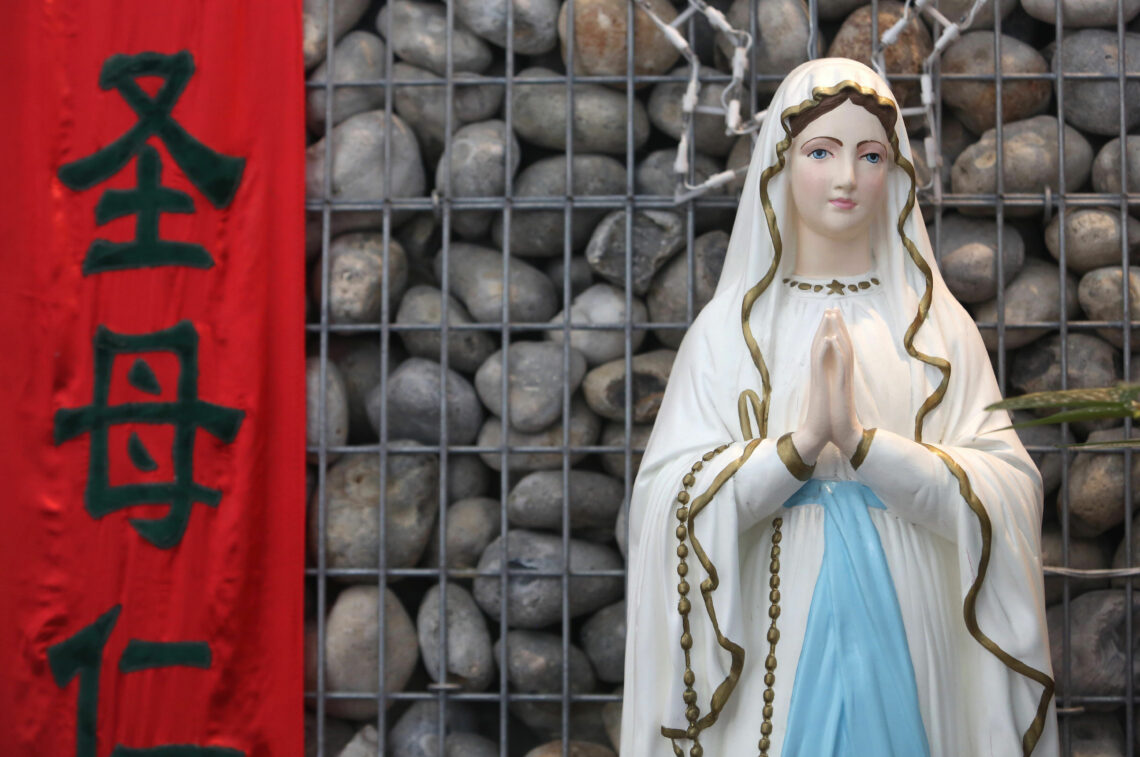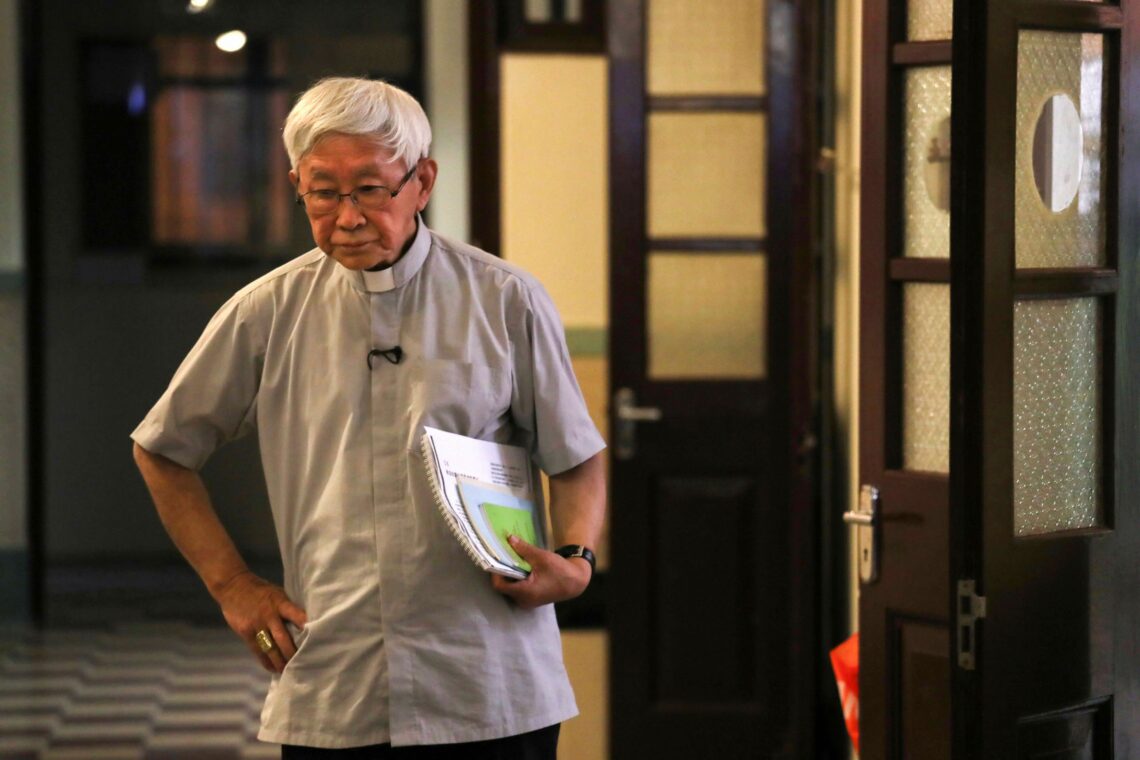Closer Beijing-Vatican ties spell trouble for Taiwan
The Vatican has agreed to continue making compromises with Beijing regarding the mutual recognition of bishop appointments. However, China has its own agenda for relations with the Vatican – one that would have the Holy See cut ties with Taiwan.

In a nutshell
- Relations between China and the Vatican are growing closer
- The Holy See is determined to have an embassy in Beijing
- This could worsen Taiwan’s diplomatic standing
In 2018, the Vatican and China signed a secret agreement after decades of negotiations. The deal was due to expire on September 22 of this year, but Pope Francis is reported to have approved a two-year extension. When the first arrangement was signed, the Pope recognized eight bishops appointed by the Chinese government. In return, China acknowledged two bishops ordained by the Vatican.
Beijing and the Holy See
Since the 1950s, Sino-Vatican relations have faced two major challenges. One concerns diplomacy: whether to recognize China or Taiwan. The other is a matter of control, namely, the appointment of bishops.
China has been asking the Vatican to cut diplomatic relations with Taiwan and recognize Beijing as the sole legitimate government of China for several decades. From a technical point of view, this might not be particularly difficult – the Holy See’s diplomatic presence in Taiwan was de facto downscaled in 1971. The Vatican would only need to find a way to drop Taipei as gently and as discreetly as possible.
In 1957, the first convention of Chinese Catholics was held in Beijing. It was decided at the meeting to sever political and economic relations with the Holy See and to independently manage churches. On this issue, China’s policy has been consistent: Catholicism should be “sinicized” like other religions – a process meant to create a religion fully controlled by the Chinese Communist Party.
The appointment of bishops is one of crucial questions in the negotiations. Under the leadership of Deng Xiaoping, Jiang Zemin and Hu Jintao, China adopted a more relaxed approach toward the Vatican because the government wanted to attract Western investment.
After having imposed its National Security Law on Hong Kong, the Chinese government has adopted an increasingly hostile approach toward Taipei. Isolating Taiwan diplomatically and dissolving its remaining 15 diplomatic alliances will be part of its plan of reunification. If the Vatican gives up Taiwan and opens an embassy in Beijing, Taiwan would lose its last ally in Europe.
The Vatican’s perspective
Why would the Vatican be inclined to resume diplomatic relations with mainland China?
Yang Fenggang, an expert on religious issues at Purdue University, estimates that there were about 100 million Christians in China in 2018. In contrast, the number of Catholics in Taiwan is around 200,000. According to data from the Pew Research Center, out of China’s 9 million Catholics, 5.7 million belong to the Chinese Patriotic Catholic Association (CPCA), while most others have ties with “underground churches” deemed illegal by the government.
The Vatican is striving to normalize its relations with China.
Vatican officials who advocate relations with China believe that reconciling with Chinese authorities is the only way to help a large number of persecuted Chinese Catholics, especially members of underground churches. And reconciliation means compromise. An important Vatican official, Italian Cardinal Pietro Parolin, believes the deal with China is “for the benefit of the entire Chinese Catholic community, which I embrace fraternally – above all those who have suffered most and continue to suffer.”
For this reason, the Vatican is striving to normalize its relations with China. Establishing an embassy in Beijing is a crucial part of this strategy. Yet at the same time, it does not want to shut down its diplomatic mission in Taiwan, at least not abruptly. The Vatican – unaware of the fundamental differences between China and Vietnam – believes it can adopt the so-called Vietnam model in establishing diplomatic relations with China. Churches in Vietnam choose regional bishops, who are then recognized by the Vietnamese government. Afterward, the Vietnamese Catholic organization reports to the Vatican. The Holy See approves the list, if the Pope does not have any objection.
China’s perspective
China is not against the Vietnamese model. After decades of sinicization of Christianity, the CCP has gained a lot of experience. Beijing is trying to convince the Vatican that its bishop could be appointed both in a bottom-up and top-down manner.
Since 2018, both sides appear to have been going along with the arrangement. China is ready to recognize the bishops ordained by the Vatican, and vice versa. But when it comes to diplomatic relations, Beijing insists that the Vatican must sever ties with Taiwan before establishing its embassy in Beijing.

Lazy compromises
The signing of the 2018 deal renounces the Pope’s ordainment of bishops as the only source of legitimacy. The asymmetry is obvious – the Vatican recognizes eight bishops appointed by China, while China acknowledges only two bishops ordained by the Vatican. It is obvious that the Vatican has made greater compromises than China.
The pro-China camp within the Vatican seems to be motivated by undue optimism.
Several incidents this year reveal that the Vatican has begun pandering to China. For example, during the fight against the pandemic, China and Taiwan both donated medical supplies to Italy and various charities and religious organizations in Rome. The Vatican publicly praised China and purposely avoided mentioning Taiwan’s contribution. Also during the pandemic, when several countries suggested that Taiwan regain its seat at the World Health Organization, the Vatican did not speak up in favor of Taipei. When Europe condemned the Chinese authorities for forcefully introducing the national security law in Hong Kong, the Holy See remained silent.
To some extent, the pro-China camp within the Vatican seems to be motivated by undue optimism. For example, Pope Francis publicly received Xu Honggen, a bishop of mainland China, on October 5, 2016. Mr. Xu is affiliated to the CPCA. Later, in 2019, CPCA Chairman Fang Xingyao attended a bishops’ summit in the Vatican. All this has ignited the hope that Beijing, in turn, will allow Pope Francis to visit China in the near future. A key figure of Vatican diplomacy, Archbishop Claudio Maria Celli, has declared that Sino-Vatican interaction is full of “respect, clarity, co-responsibility and foresight.”
Competition of intelligence
Since the very beginning of the negotiations, many insightful Catholics have criticized and warned decisionmakers. Cardinal Joseph Zen Ze-kiun, Bishop Emeritus of Hong Kong, is one of them. He has repeatedly accused the Vatican of naivety toward China’s authoritarianism.
It is hard to assess how well the Vatican really understands Chinese circumstances. However, when it comes to how Chinese officials treat religion, Cardinal Zen Ze-kiun certainly knows much more than the Holy See.
It is worth noting that the Chinese Communist Party (CCP) strictly forbids party members from believing in any kind of religion. There are reports that in many parts of China, employees and family members of public institutions are also expected not to hold any religious creed, otherwise they risk losing their jobs.
When I graduated from the German Studies Department of Shanghai International Studies University in 1985, the secretary of the Party branch of our department summoned me to her office. I was told that China’s National Seminary of Catholic Church had recently been established. The CCP needed to send some trustworthy young people who knew foreign languages to study and work for the party there. She asked me if I was interested. At the time, I found religious studies fascinating. However, judging from the tasks Mrs. Chen described, it was obvious she wanted me to become an informant for the CCP. The offer disturbed me. I finally declined her offer as politely as I could. With this in mind, it is conceivable that the CCP has been keeping a considerable number of informants in the Catholic Church since 1985.
Scenarios
It can be expected that, due to pressure from the international community, for now the Vatican will not completely abandon Taiwan. At the same time, China is not fully ready to accept a Vatican embassy in Beijing, although it is very likely to make empty promises.
A religious embassy differs from usual diplomatic missions. Once a Vatican foothold is established in China, the interaction between the Holy See and Chinese believers will be inevitable. For the time being, the Vatican will not accept an embassy that is completely at the mercy of Chinese authorities. Yet, its desire to have an embassy in Beijing is incredibly strong.
The Vatican is waiting for the right moment to establish diplomatic relations with Beijing. Sooner or later, Taiwan will lose an ally, unless the West rallies to defend it. Sadly, the Taiwan issue is a low priority for most major Western countries.
As for the appointment of bishops, the first agreement has laid the foundation. The second deal will merely be a continuation of the first. But it will also herald an era of closer Sino-Vatican relations. U.S. State Secretary Mike Pompeo has been trying to convince the Vatican to discard the second agreement with Beijing. The Pope, however, will stick to his normalization plan.







